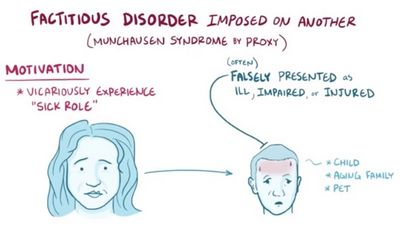Munchausen by Proxy (MSP), also known as Munchausen’s Syndrome, is an emotional disorder characterized by extreme focus on one’s own physical appearance and by inappropriate behaviors in those in their care.

As medical professionals strive to understand what is causing the child’s behavioral problems, the intentional actions of the caregiver can often exacerbate the problems caused by an unsupportive relationship. In other words, MSP can become an emotional eating disorder and become so bad that it is difficult for an individual to function properly in society.
Munchausen has its origins in the malpractice or legal situation of a doctor that has been accused of treating a patient with the knowledge that the person was not actually ill. This doctor may have performed physical exams to find out if there was anything physically wrong with the patient, but instead has given the impression that the patient was really ill.

In the case of children, this could include lying about when the illness occurred in order to avoid having to tell the child that he/she had been infected.
The symptoms of Munchausens Syndrome can become very intense and they can sometimes interfere with a child’s ability to function appropriately in society. Children will exhibit numerous behavior problems as well as the symptoms of eating disorders, such as an inability to gain weight, obesity, being excessively self-conscious, and/or a feeling of shame due to their inability to fit in with their peers. There may also be feelings of guilt as a result of their condition. These feelings will be compounded by the fact that they will usually have very few friends and will often resort to isolating themselves from the rest of the world.

If you suspect that your child is suffering from any of these symptoms, and you suspect that you are having a problem with a child suffering from MSP, then you should talk with a licensed mental health professional.
One of the most common ways that an individual with MSP by Proxy can affect the lives of others is by causing a lack of trust in the child’s environment. This distrust can be caused by exhibiting signs of manipulation, deception, lying, or even stealing. When this happens, it can leave the child feeling isolated and unhappy. There may also be problems in the child’s relationships with his/her peers and school and this will lead to the child feeling alienated from his/her peer group of peers.

This can make it more difficult for him/her to be accepted into the school and also make it difficult for the individual to function properly at school.
There may also be an underlying fear that a child suffering from Munchausen’s Syndrome may cause a negative effect on others. These fears can be caused by the fear that another child may catch the individual and may also cause that child to be afraid of leaving the comfort of their home or that they will get lost or be abandoned.
Because it is possible for children to lie to their doctors and to the public, medical professionals have to become very careful and thorough when investigating these cases. There may be a possibility that the individual is simply faking his/her symptoms. If this is the case, the doctor may have to ask a lot of probing questions and may have to wait until the child is older to be able to diagnose the condition of Munchausens Syndrome by Proxy.
In order to treat Munchausens Syndrome by Proxy, there may be some serious medications and psychotherapy involved.

Once the conditions that are causing the condition have been properly treated, it will be easier for the child to recover and to return to the normal environment. Sometimes this may take a long time because the individual may be having difficulties adjusting to a new and less stressful life.
It may also be necessary for some family members of the patient to be involved in the treatment of the individual. Sometimes this may include asking for the help of a friend or relative who may also suffer from Munchausens Syndrome. In some instances, there may be a need to seek out outside funding.